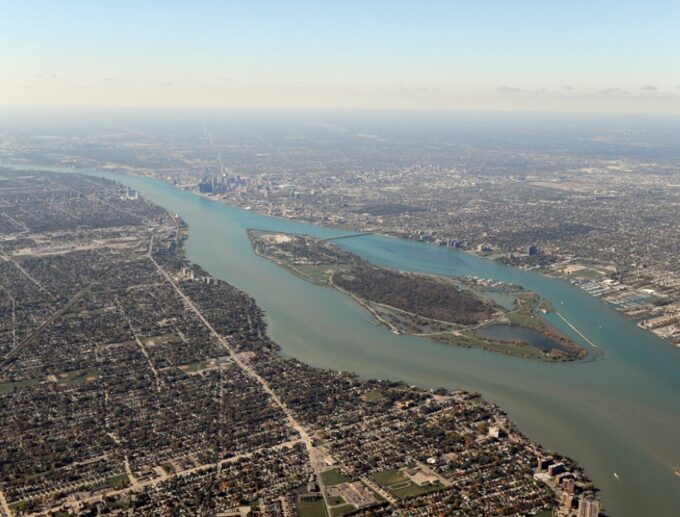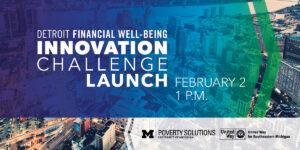New $2 million Innovation Challenge to address financial instability of Detroiters

Feb. 2 virtual launch event co-hosted by United Way for Southeastern Michigan and University of Michigan Poverty Solutions
Contact: Jerome Espy, Jerome.espy@liveunitedsem.org
Lauren Slagter, lslag@umich.edu
DETROIT — A study on barriers to financial success for Detroiters has sparked a $2 million Financial Well-Being Innovation Challenge that aims to support innovative ideas to address systemic barriers to economic mobility.
Titled The Financial Well-Being of Detroit Residents: What Do We Know?, the study was released by University of Michigan’s Poverty Solutions and United Way for Southeastern Michigan in early 2021. The study found evidence of deep and persistent financial disadvantages for Detroiters with low to moderate incomes.
The public is invited to the launch of the Innovation Challenge at 1 p.m. on Feb. 2, 2022, to learn more about how this research will translate into meaningful action. The virtual event will feature active leaders from across the community and dignitaries dedicated to the residents of Detroit.
A combination of low and volatile incomes and disproportionately high costs associated with living in Detroit makes it challenging for tens of thousands of residents to maintain consistently positive cash flow and build savings, leading many households to accrue unmanageable debt and suffer low credit scores. These disadvantages are the result of deep structural inequities and systemic barriers to financial stability and economic mobility.
Funded by JPMorgan Chase, General Motors, Comerica, and United Way, the Detroit Financial Well-Being Innovation Challenge looks to bring about concrete action to improve financial well-being in Detroit. The multi-year effort will provide seed funding for innovative pilot programs/initiatives to address the underlying structural and systemic barriers to financial well-being identified in the report. In their work, awardees will set a path forward to solutions for those in need across the community.
“These are turbulent times for everyone, but some communities are measurably impacted more than others. Opportunity gaps and systemic barriers to financial stability for the most vulnerable, particularly among Black and Brown populations have persisted far too long,” said Darienne Hudson, president and CEO, United Way for Southeastern Michigan. “The research by the University of Michigan allows us to all better understand the challenges faced by individuals and families in Detroit each day and begin the work of building tangible and lasting solutions.”
In addition to the work of awardees, the Challenge is committed to actively gathering and acting on feedback from Detroit residents who have first-hand experience facing financial difficulties.
“This opportunity asks the Detroit community to think bigger and work collaboratively toward what’s needed to reduce financial instability in the city. Even better, the Innovation Challenge provides tangible support to community partners who want to test and scale new approaches to improving Detroiters’ financial lives,” said Afton Branche-Wilson, assistant director of community initiatives at Poverty Solutions and lead author of the financial well-being report.

The Challenge Process
The Detroit Financial Well-Being Innovation Challenge will occur in four stages over the next several years. The Challenge is designed to support applicants through the process of developing their ideas from concepts to fully operational programs or initiative. Each stage has a distinct focus, and United Way will provide technical assistance at each stage. We are committed to centering the experience of Detroiters who know first-hand what it is like to struggle to make ends meet. Throughout the challenge, there will be multiple opportunities for community involvement and feedback.
About the Report that Inspired the Challenge
The study, The Financial Well-Being of Detroit Residents: What Do We Know?, builds on United Way’s ALICE report. United Way’s ALICE report shows that 40% of families statewide and more than 74% of Detroit families struggle to meet their basic needs. The report, written by researchers at University of Michigan’s Poverty Solutions, delves in-depth to identify the underlying reasons it is so difficult for the average Detroiter to consistently make ends meet – more so than in suburban towns and peer cities.
To register for the Detroit Financial Well-Being Innovation Challenge, click here.
For more information about United Way for Southeastern Michigan and their commitment to serving the community or to donate, please visit: UnitedWaySEM.org.
For more information about United Way’s ALICE report, please visit: https://www.uwmich.org/alice
For more information about the University of Michigan’s Poverty Solutions, please visit: https://poverty.umich.edu/
ABOUT UNITED WAY FOR SOUTHEASTERN MICHIGAN
United Way for Southeastern Michigan, a member of the United Way Worldwide network and an independently governed 501(c)(3) nonprofit organization, works to help households become stable and ensure children have the support they need to thrive. For more than 100 years, United Way has been a leader in creating positive, measurable, and sustainable change in communities throughout southeast Michigan. United Way works in partnership with donors, agencies, corporate and municipal partners to help families meet their basic needs of housing, food, health care and family finances, and ensure children start school ready to learn and graduate ready for life. To give, advocate, volunteer or learn more, visit UnitedWaySEM.org.
ABOUT UNIVERSITY OF MICHIGAN’S POVERTY SOLUTIONS
Poverty Solutions is a university-wide initiative that aims to prevent and alleviate poverty through action-based research that informs policymakers, community organizations, government entities, and practitioners about what works in confronting poverty.
